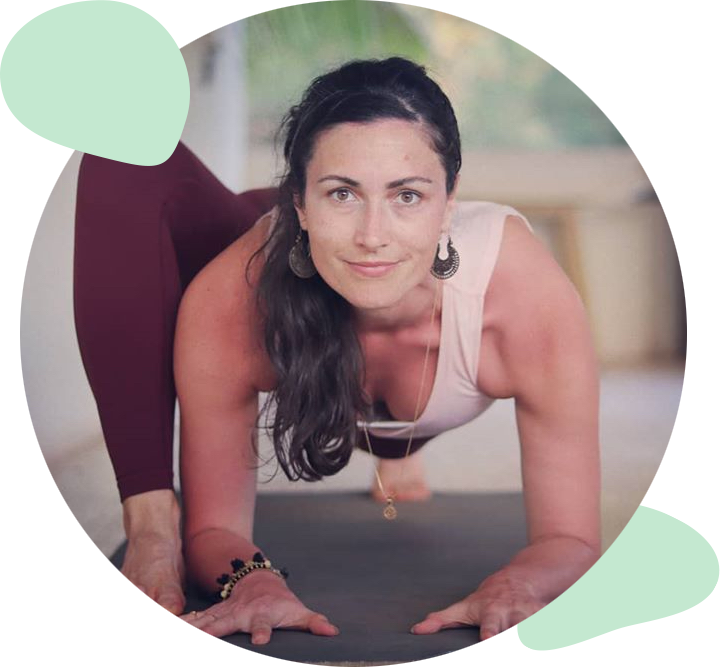Yoga & Music
I am sure that this special attention to rhythm and music has greatly contributed to my growing love for the practice of yoga because music plays a major role in regulating my mood, my emotions, but mostly my focus (I have the attention span of a cat). That's why when I saw on Marcus' instagram page that his yoga school - Good Life Yoga School, which he co-runs with Hannah Whittingham - was organizing a Rocket X Ableton training to learn how to create our own mixes for our classes, I didn't hesitate for a second.
Ableton Live
Ableton Live is a sound design software that allows you to compose and/or mix tracks together. The scope of the training was learning to mix tracks together nicely in order to have a continuous track with a steady beat to teach with. The training was open to anyone and no prior experience or musical background was required. Personally, I had only played a bit with Garage Band — which is the sound design software that comes with most iOS devices — but I never dug into anything beyond recording analog instruments and adding reverb or sometimes delay to the whole channel. My musical background helped me understand quickly the concept of tempo and finding the beat, but I definitely learned loads about how and why music and beats affect the brain and therefore the yoga practice.
Our teacher — Flaminia Agrimi — is a London-based artist and sound designer. She's a real Ableton wizard and even more importantly in the context of this training, she's a very patient, thorough and knowledgeable teacher, on top of being a lovely human being. We went through the basics of the interface of Ableton — which can be a bit overwhelming when you're not used to professional creation software — and the most important commands to add, cut, copy and paste tracks and bits of tracks. We learned to recognise the first beat, mark it for each track so they were all perfectly aligned, which makes the mixing part easier. Then we explored some of the numerous effects that Ableton provides, playing with EQ, delay, reverb and other filters. The training ended with the creation of a 15min mix.
Music for yoga
But what does having a tailor-made mix change in your yoga practice? Maybe some of you, like hardcore ashtangi, do not practice with anything; no music, no blocks, no strap. However, if you like practicing with music, surely you've already noticed the effect of it on your practice. You may have experienced a terrible playlist that completely put you off. Or a lovely one that really got you "in the zone". I certainly did. On top of affecting your own practice — in a good or bad manner — your teacher's playlist is a way to get to know them a bit better. Their taste, their mood, their energy and vibes. After all, yoga is about making connections, and I've definitely connected with most of my friends on a musical level to start with.
When a playlist is well designed, it helps you keep your focus on the task at hand: in this case breathing consistently whilst moving mindfully. It can also shape the energy of the class, which is an interesting notion to explore when teaching various styles, at different times of the day. For sure my Sunday night Yin playlist will be very different from my Thursday lunch break Dynamic Vinyasa one.
Music has an enormous influence on the brain lighting up areas involved in hearing, movement, reward, memory and emotion. It triggers the release of dopamine bringing about a natural sense of wellbeing, endorphins for a natural high, acts as a pain killer for aching limbs, and can also trigger the release of oxytocin, increasing emotional understanding and peak emotion.
This is what happens in your brain when you listen to music. As a result, it helps you build more stamina as the more your brain is distracted by the music, the less it focuses on fatigue or pain. Which is why my dentist recommended me to listen to music whilst he removed my wisdom teeth when I was a teen. And which is why I sadly can't listen to Jamiroquai anymore. But not every type of music will work when it comes to practicing yoga (or focusing on a task). The right music has to be just interesting and enjoyable enough to get your brain's attention, but not too complex or too powerful so that your brain only focuses on it. That's why repetitive music such as techno, electro or trance, with no or just a few vocals, are the perfect choices to get to this flow state.
If I haven't managed to convince you yet, I highly recommend you practice with either Marcus or Hannah and pay extra attention to the breath throughout the practice. Sync with the music and stick with it especially when it becomes challenging. Take a mental note of how the beat helps you and how you feel at the end of the class. But beware: from that point, yoga will never feel the same as you'll reach a brand new level of Samadhi.
Comments
Leave a comment.Fields marked with a * are compulsory. Your email won't be published.
Thanks, your comment has been posted successfully. It will be visible on the website once it's approved.
Google says you're a bot...

 By Cyro
By Cyro 